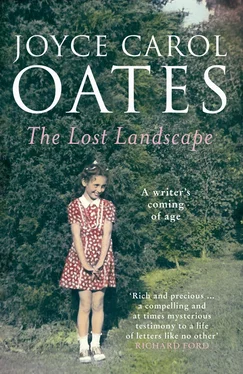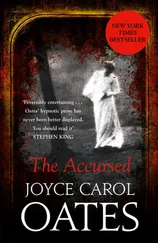“Photo Shoot: West Eleventh Street, New York City, March 6, 1970” originally appeared, in a shorter form, under the title “Nostalgia” in Vogue , April 2006; reprinted in Port , 2014.
“Food Mysteries” originally appeared, in a substantially different form, in Antaeus 1991; reprinted in Not By Bread Alone edited by Daniel Halpern, 1992.
“Facts, Visions, Mysteries: My Father Frederic Oates, November 1988” originally appeared, in a substantially different form, in the New York Times Magazine , March 1989; reprinted in I’ve Always Meant to Tell You , edited by Constance Warloe, 1996.
“A Letter to My Mother Carolina Oates on Her Seventy-eighth Birthday, November 8, 1994” originally appeared, in a slightly different version, in the New York Times Magazine , 1995; reprinted in this version in I’ve Always Meant to Tell You edited by Constance Warloe and in The Norton Anthology of Autobiography edited by Jay Parini, 1999.
“My Mother’s Quilts” originally appeared, in a slightly shorter form, in What My Mother Gave Me: Thirty-One Women on the Gifts That Mattered Most , edited by Elizabeth Benedict, 2013.
I
WE BEGIN AS CHILDRENimagining and fearing ghosts. By degrees, through our long lives, we come to be the very ghosts inhabiting the lost landscapes of our childhood.
Carolina Oates and Joyce, backyard of Millersport house, May 1941. (Fred Oates)
MAY 14, 1941. ITwas a time of nerves. Worried-sick what was coming my father would say of this time in our family history but who could guess it, examining this very old and precious snapshot of Mommy and me in our backyard playing with kittens?
LOOKED LIKE I WOULD be drafted. Nobody knew what was coming. At Harrison’s, we were working double shifts. In the papers were cartoons of Hitler but none of it was funny . The nightmare of Pearl Harbor is seven months away but the United States has been in a continuous state of nerves since Hitler executed his blitzkrieg against an unprepared Poland in September 1939; by May 1941, with England under attack, the United States is engaged in an undeclared war in the Atlantic Ocean with Germany . . . But I am two years, eleven months old and oblivious to the concerns of adults that are not immediate concerns about me.
MY TWENTY-SEVEN-YEAR-OLD FATHER FREDERICOates, whom everyone calls “Fred” or “Freddy,” is taking pictures of Mommy and me behind our farmhouse in Millersport, New York; it is a day when Daddy is not working on the assembly line at Harrison Radiator, a division of General Motors seven miles away in Lockport, New York, involved in what is believed to be “defense work.” It is a tense, rapidly-shifting, unpredictable era before TV when news comes in terse radio announcements and in the somber pages of the Buffalo Evening News delivered in the late afternoon six days a week. But such global turbulence is remote from our farm in western New York where everything is green and humid in prematurely hot May and the grass in the backyard grows thick and raggedy. Here my twenty-four-year-old mother Carolina, whom everyone calls “Lena,” is cuddling with me in the grass playing with our newborn black kittens, smiling as Daddy takes pictures.
TAKING PICTURES WITH THEblue box camera. Of dozens, hundreds of pictures taken in those years only a few seem to have survived and how strange, how astonishing it would have been for us to have thought, in May 1941— These pictures will outlive us!
How happy we are, and how good and simple life must have seemed to that long-lost child Joyce Carol—(who did not know that she was to be the “firstborn” of three children)—with little in her life more vexing than the ordeal of having her curly hair brushed and combed free of snarls and fixed in place with ribbons, and being “dressed up” for some adult special occasion.
You can see in the snapshot behind Mommy and me a young, black-barked cherry tree and behind the tree the somewhat dour two-storey wood frame farmhouse owned by my mother’s stepparents John and Lena Bush. Built in 1888 on Transit Road, at the time a narrow two-lane country road linking the small town of Lockport with the sprawling city of Buffalo twenty miles away, and surprisingly large by Millersport standards (where some of our neighbors’ houses were single-storey, lacking cellars, hardly more than cabins or shanties), this steep-roofed farmhouse was razed decades ago yet resides powerfully—indomitably!—in my memory, the site of recurring dreams. (In a dream of the old farmhouse in Millersport I recognize, not a visual scene, but a sensation: a tone, a slant of light. Often, details are blurred. If there are human figures, their faces are blurred. I seem to know where I am, and who is with me, though I might not be able to name anyone. Just that sensation, both comforting and laced with a kind of visceral dread— Back home. ) Note the exterior cellar door, a common sight in this now-vanished rural America, like the rain barrel at the corner of the house where rainwater was collected—and used for all purposes except drinking.
Behind Daddy as he takes our picture (and not visible to the viewer) is the farmyard: weatherworn barn with pewter lightning rod atop the highest pitch of the roof; chicken coop surrounded by a barbed-wire fence to keep out raccoons, foxes, and the wandering dogs of neighbors; storage sheds; fields, fruit orchards. To the right of the sliding barn doors is a smaller door leading into the corner of the barn that houses my grandfather Bush’s smithy with its anvil and hammer, blacksmith tools, small coal furnace and bellows that turns with a crank. Red-feathered chickens with no idea that they are “free range” are wandering about pecking in the dirt, oblivious of all else. All these—lost.
TAKING PICTURES HAS BEENour salvation. Without taking pictures our memories would melt, evaporate. The invention of photography in the nineteenth century—and the “snapshot” in the twentieth century—revolutionized human consciousness; for when we claim to remember our pasts we are almost certainly remembering our favorite snapshots, in which the long-faded past is given a visual immortality.
TAKING PICTURES WAS ANadult privilege in 1941. My way of taking pictures was to scribble earnestly with Crayolas in coloring books and in tablets. Grass would be horizontal motions of the green crayon. Black kitten, black crayon. Chickens were upright scribbles, vaguely humanoid in expression. My parents, I would not attempt. No human figures would appear in any of my childhood drawings, only very deep-green grass and trees, kittens and cats with fur of many hues, Rhode Island Red chickens.
NO ROMANCE IS SOprofound and so enduring as the romance of early childhood. The yearning we feel through our lives for our young, attractive and mysterious parents—who were so physically close to us and yet, apart from us, inaccessible and unknowable. Is this the very origin of “romance,” coloring and determining all that is to follow in our lifetimes? I am drawn to stare at these old family snapshots lovingly kept in albums and in envelopes. And so I am drawn too to snapshots of strangers’ families, sifting through boxes of old postcards and snapshots in secondhand shops—though these individuals are not “my” family, yet frequently they are not so very different from my family. Children in snapshots of long-ago, given a spurious sort of immortality by an adult’s love, and all of them probably now departed. The almost overwhelming wish comes to me— I want to write their stories! That is the only way I can know these strangers—by writing their stories . . .
Читать дальше












